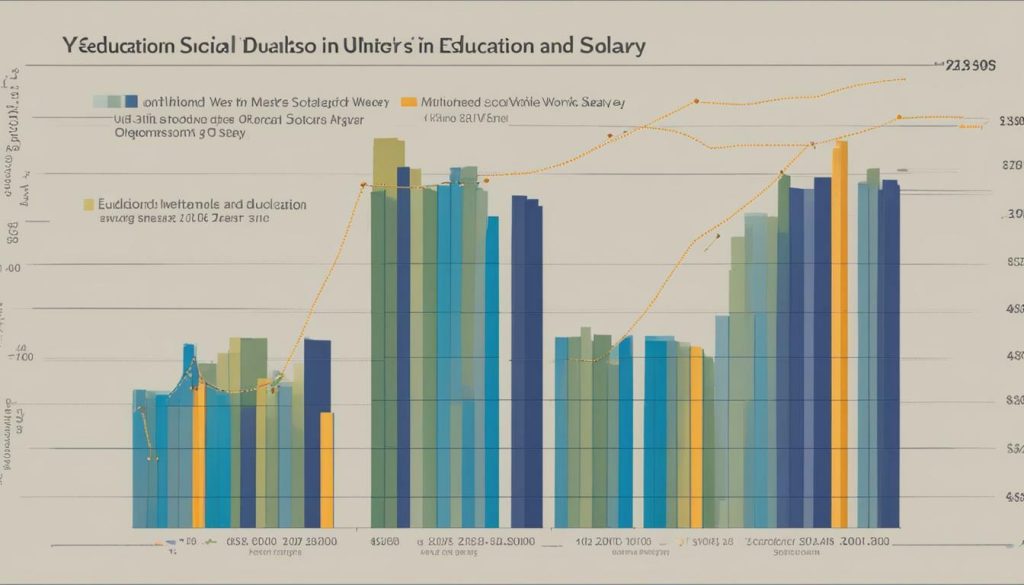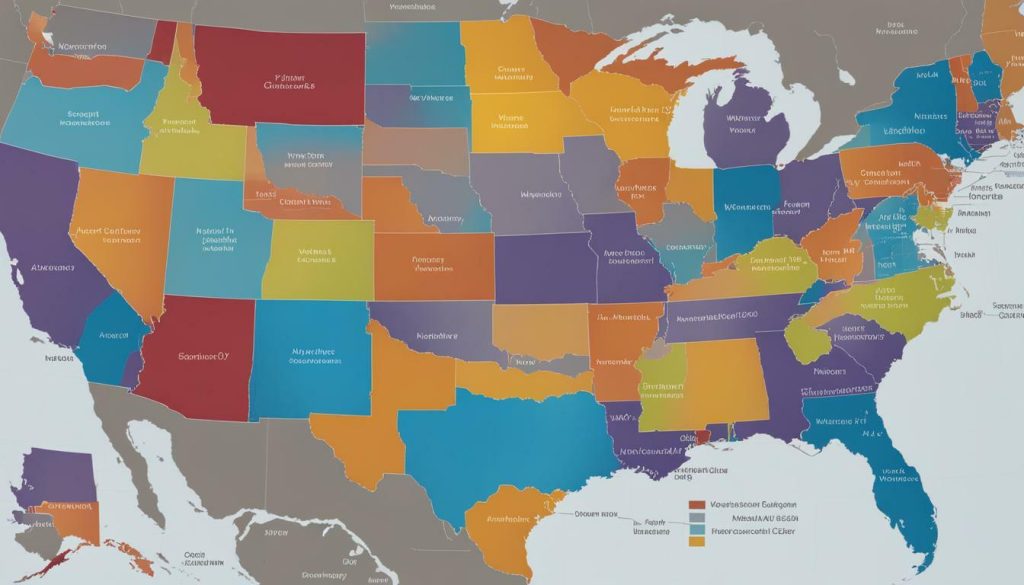
Social worker salary in the United States can vary based on various factors and specializations. Factors such as education, experience, specialization, sector, and geographic location all play a role in determining the salary range for social workers. Different roles and specializations within the profession also come with different salary ranges.
For instance, child and family social workers earn an average of $50,000 to $60,000 per year, while school social workers typically earn between $45,000 and $55,000 annually. Medical and healthcare social workers have an average salary ranging from $60,000 to $70,000 per year, while mental health and substance abuse social workers earn around $45,000 to $55,000 annually.
Higher levels of education, particularly a master’s degree in social work, can also significantly impact social worker salaries. Additionally, geographic location plays a role, with social workers in metropolitan areas or regions with a high cost of living generally earning higher salaries.
While social work is a rewarding profession, it is essential to acknowledge the challenges and limitations associated with social worker salaries. On average, the salary for social workers in the United States is $50,102 per year. However, this average can vary significantly depending on the state. For example, Oregon has the highest average salary of $67,057, while South Dakota has the lowest at $42,906.
Key Takeaways:
- Factors such as education, experience, specialization, sector, and geographic location influence social worker salaries.
- Different specializations within social work come with varying salary ranges.
- A master’s degree in social work can lead to higher earning potential.
- Social workers in metropolitan areas or regions with a high cost of living generally earn higher salaries.
- The average salary for social workers in the United States is $50,102 per year, with state variations.
Factors Affecting Social Worker Salary
Several factors impact social worker salary, including education, experience, specialization, sector, and location. These variables play a significant role in determining the earning potential of social workers across different roles and specializations.
Education is a key factor that influences social worker salaries. Social workers with higher levels of education, such as a master’s degree in social work (MSW), generally earn higher salaries compared to those with only a bachelor’s degree. Advanced degrees provide social workers with specialized knowledge and skills that are highly valued in the field.
Experience is another important factor in salary determination. Social workers with more years of experience tend to command higher salaries due to their expertise and demonstrated competence in working with diverse populations and complex issues. As social workers gain experience, they often take on more advanced roles and responsibilities, which can lead to salary increases.
Specialization within the social work profession also affects salary ranges. Different specializations, such as child and family social work, school social work, medical and healthcare social work, and mental health and substance abuse social work, have varying salary ranges. For example, child and family social workers earn around $50,000 to $60,000 per year, while school social workers earn about $45,000 to $55,000 annually. Medical and healthcare social workers have an average salary of $60,000 to $70,000 per year, while mental health and substance abuse social workers earn around $45,000 to $55,000 annually.
Social Worker Salary Ranges by Specialization
| Specialization | Salary Range |
|---|---|
| Child and Family Social Work | $50,000 – $60,000 |
| School Social Work | $45,000 – $55,000 |
| Medical and Healthcare Social Work | $60,000 – $70,000 |
| Mental Health and Substance Abuse Social Work | $45,000 – $55,000 |
The sector in which social workers practice can also impact their salaries. Social workers employed in the public sector, such as government agencies and schools, may have different salary structures compared to those working in the private sector, such as non-profit organizations or private practices. Additionally, the geographic location of social work practice plays a significant role in salary determination. Social workers in metropolitan areas or regions with a high cost of living generally earn higher salaries compared to those in rural or low-cost areas.
It is essential for aspiring social workers to understand the various factors that affect salary and to consider all aspects, including financial rewards, benefits, and non-monetary rewards, when making career choices. While social work is a fulfilling profession, it is important to have a realistic understanding of the financial aspects and to carefully evaluate the factors that will contribute to salary potential in the chosen field.
Salary Ranges for Different Specializations
Different specializations within social work have varying salary ranges. Understanding the salary potential for different roles in the field can help aspiring social workers make informed career choices. Let’s take a closer look at the salary ranges for some common specializations within social work:
- Child and Family Social Workers: Child and family social workers play a crucial role in supporting families and protecting the welfare of children. On average, they can expect to earn around $50,000 to $60,000 per year.
- School Social Workers: School social workers work closely with students, parents, and educators to address social, emotional, and behavioral issues. Their salary typically ranges from $45,000 to $55,000 annually.
- Medical and Healthcare Social Workers: Medical and healthcare social workers provide support to patients and their families in navigating the healthcare system. They earn an average salary of $60,000 to $70,000 per year.
- Mental Health and Substance Abuse Social Workers: Mental health and substance abuse social workers help individuals struggling with mental health disorders and substance abuse issues. Their salary ranges from $45,000 to $55,000 annually.
It’s important to note that these salary ranges are approximate and can vary based on factors such as experience, education, location, and the employing organization’s size and resources.

Despite the variations in salary, social workers find fulfillment in making a positive impact in people’s lives. However, it’s essential to have a realistic understanding of the financial aspects of the profession and consider factors beyond salary when choosing a career in social work.
Impact of Education on Social Worker Salary
The level of education plays a role in determining social worker salary and potential earning capacity. As social work is a profession that requires specialized knowledge and skills, individuals with higher levels of education, such as a master’s degree in social work (MSW), tend to earn higher salaries.
According to data from the Bureau of Labor Statistics, social workers with an MSW typically earn a higher median salary compared to those with a bachelor’s degree. In 2020, the median annual wage for social workers with an MSW was $51,760, while those with a bachelor’s degree earned a median wage of $51,110.
| Educational Level | Median Annual Wage (2020) |
|---|---|
| Bachelor’s Degree | $51,110 |
| Master’s Degree (MSW) | $51,760 |
Having a higher level of education not only increases earning potential but also opens up more career opportunities within the social work field. Social workers with an MSW may have access to advanced roles in administration, supervision, or clinical practice, which often come with higher salaries.

While education is an important factor in determining social worker salary, it is not the only factor. Experience, specialization, sector, and geographic location also play significant roles in salary variations within the profession. It is important for aspiring social workers to consider these factors when evaluating their career choices and to have a realistic understanding of the financial aspects of the profession.
Geographic Variations in Social Worker Salary
The geographic location can significantly impact the salary of social workers. In the United States, social workers in different states may experience variations in their earning potential due to factors such as cost of living, demand for social workers, and state-specific regulations.
“The salary for social workers in Oregon is the highest among all states, with an average annual income of $67,057.”
Table 1: State-by-State Comparison of Social Worker Salaries
| State | Average Salary |
|---|---|
| Oregon | $67,057 |
| California | $65,250 |
| New Jersey | $64,980 |
| Connecticut | $64,410 |
| Alaska | $63,270 |
On the other hand, social workers in South Dakota earn the lowest average salary at $42,906 per year. It is important to note that these figures represent average salaries and individual social worker salaries may vary based on education, experience, and other factors.

While salary is a crucial factor to consider, aspiring social workers should also evaluate the overall compensation package, including benefits and non-monetary rewards, when making career choices. Social work is a fulfilling profession that allows individuals to make a positive impact on society, but it is essential to have a realistic understanding of the financial aspects of the profession.
Average Social Worker Salary in the United States
The average salary for social workers in the United States is $50,102 per year. However, this figure can vary depending on various factors, including education, experience, specialization, sector, and geographic location. Social workers in different roles and specializations have varying salary ranges.
For example, child and family social workers earn around $50,000 to $60,000 per year, while school social workers earn about $45,000 to $55,000 annually. Medical and healthcare social workers have an average salary of $60,000 to $70,000 per year, while mental health and substance abuse social workers earn around $45,000 to $55,000 annually.

Higher levels of education, such as a master’s degree in social work, tend to result in higher salaries. Geographic location also plays a significant role, with social workers in metropolitan areas or regions with a high cost of living earning higher salaries.
State-by-State Comparison of Social Worker Salaries
When examining social worker salaries across different states, it becomes evident that there is a considerable variation. Oregon has the highest average salary for social workers, standing at $67,057 per year, while South Dakota has the lowest average salary at $42,906 per year.
When considering a career in social work, it is important to have a realistic understanding of the financial aspects. While social work can be rewarding in terms of impact and purpose, it is essential to consider factors such as salary, benefits, and non-monetary rewards when evaluating career choices. By weighing these factors and understanding the variations in social worker salaries, aspiring social workers can make informed decisions about their professional path.
| State | Average Salary |
|---|---|
| Oregon | $67,057 |
| California | $65,770 |
| New Jersey | $63,259 |
| Connecticut | $62,513 |
| New York | $62,017 |
| South Dakota | $42,906 |
State-by-State Comparison of Social Worker Salaries
Social worker salaries vary across states, with some states offering higher average salaries than others. When considering a career in social work, it’s important to understand the salary potential in different locations. To help aspiring social workers make informed decisions, let’s take a closer look at the average salaries in various states.
| State | Average Salary |
|---|---|
| Oregon | $67,057 |
| Connecticut | $65,979 |
| California | $64,690 |
| New Jersey | $63,470 |
| Washington | $61,811 |
| New York | $61,225 |
| Massachusetts | $60,747 |
| District of Columbia | $60,352 |
| Rhode Island | $59,569 |
| Hawaii | $58,513 |
On the other end of the spectrum, some states offer lower average salaries for social workers. These states may have a lower cost of living or fewer resources allocated to social work. Here are the states with the lowest average social worker salaries:
- South Dakota – $42,906
- Arkansas – $43,089
- Mississippi – $43,256
- Kentucky – $43,779
- West Virginia – $43,970
Keep in mind that these figures represent the average salaries for social workers across the entire state. Salaries may vary within different regions and cities, depending on factors such as demand, cost of living, and local government funding.
When deciding where to pursue a social work career, it’s essential to consider not only the salary but also other aspects like job opportunities, work-life balance, and personal values. While higher salaries can provide financial stability, the impact of the work and the fulfillment it brings should also be taken into account.
Considering Salary in Social Work Career Choices
When considering a career in social work, it is essential to evaluate the financial aspects of the profession alongside other factors. While social work is a rewarding field that focuses on helping others and making a positive impact, it is important to have a realistic understanding of the financial implications.
Factual data shows that the average salary for social workers in the United States is $50,102 per year. However, this can vary significantly based on factors such as education, experience, specialization, sector, and geographic location. Social workers in different roles and specializations have varying salary ranges.
For instance, child and family social workers earn around $50,000 to $60,000 per year, while school social workers make approximately $45,000 to $55,000 annually. Medical and healthcare social workers have an average salary of $60,000 to $70,000 per year, and mental health and substance abuse social workers earn around $45,000 to $55,000 yearly. Higher levels of education, like a master’s degree in social work, often result in higher salaries.
Geographic location also plays a significant role in social worker salaries. Social workers in metropolitan areas or regions with a high cost of living generally earn higher salaries than those in rural areas. For example, the state of Oregon has the highest average social worker salary at $67,057, while South Dakota has the lowest at $42,906.
While it’s important to acknowledge the financial aspects of a social work career, it’s equally important to consider other factors like job satisfaction, personal fulfillment, and the opportunity to positively impact lives. Social work offers intrinsic rewards that go beyond monetary compensation, including the satisfaction of helping others, creating meaningful connections, and advocating for social justice.
Ultimately, when making career choices in social work, it’s crucial to strike a balance between financial considerations and the intrinsic rewards of the profession. By carefully evaluating the salary, benefits, and potential for growth, aspiring social workers can make informed decisions that align with their personal and professional goals.
FAQ
What factors affect social worker salary?
Social worker salary can be influenced by factors such as education, experience, specialization, sector, and geographic location.
What are the salary ranges for different specializations within social work?
The salary ranges vary for different specializations within social work. Child and family social workers earn around $50,000 to $60,000 per year, school social workers earn about $45,000 to $55,000 annually, medical and healthcare social workers have an average salary of $60,000 to $70,000 per year, and mental health and substance abuse social workers earn around $45,000 to $55,000 annually.
How does education impact social worker salary?
Higher levels of education, such as a master’s degree in social work, tend to result in higher salaries for social workers.
How does geographic location affect social worker salary?
Geographic location plays a role in social worker salary, with social workers in metropolitan areas or regions with a high cost of living typically earning higher salaries.
What is the average social worker salary in the United States?
The average salary for social workers in the United States is $50,102 per year.
Which state has the highest average social worker salary?
Oregon has the highest average social worker salary in the United States, with an average of $67,057 per year.
Which state has the lowest average social worker salary?
South Dakota has the lowest average social worker salary in the United States, with an average of $42,906 per year.
What should aspiring social workers consider when evaluating their career choices?
Aspiring social workers should have a realistic understanding of the financial aspects of the profession and consider factors such as salary, benefits, and non-monetary rewards when evaluating their career choices.



